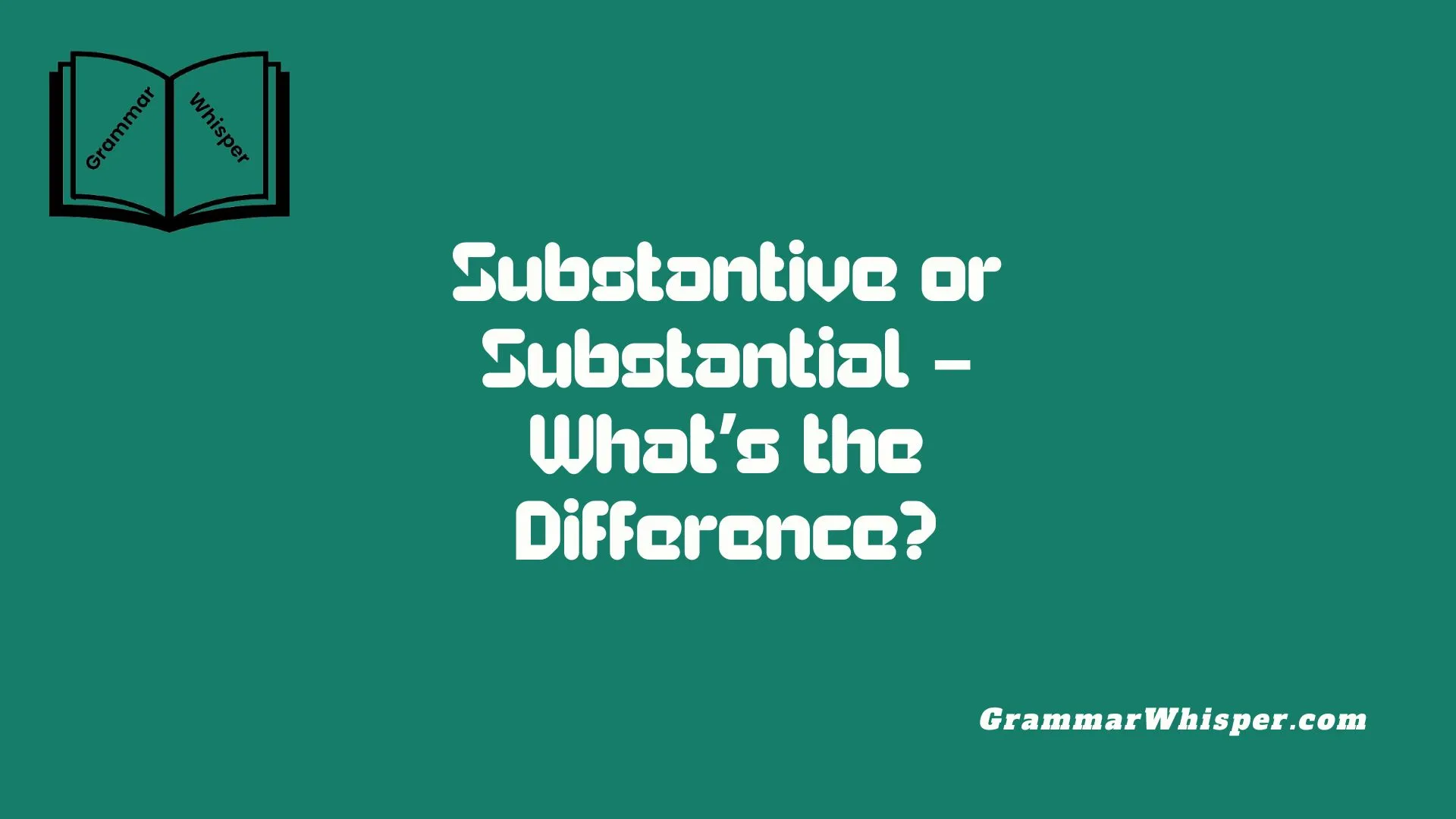Many professionals, including writers and editors, can find themselves second-guessing even with a strong command of the English language. The words Substantive and Substantial are a classic duo that seem similar at first glance but differ in meanings, contexts, and use. I’ve definitely hesitated when choosing between them – they look related, sharing a root, yet aren’t fully interchangeable. While one leans toward content and significance, the other suggests size or amount. Recognizing this difference spared me from slip-ups in communication, especially in situations where clarity matters most.
What changed things for me was developing the know-how to spot their nuances and apply them like a pro. The rich variety of the English language is full of such pairs that can trip you up until you’re properly equipped with a clear understanding. These words show up often in writing, and learning their exact meanings has made my work more helpful, confident, and accurate. It’s amazing how refining just one word choice can improve the precision and professionalism of your writing.
Why Word Choice Between “Substantive” and “Substantial” Matters
Choosing the right word isn’t just about grammar – it’s about credibility, clarity, and impact.
Using “substantial” when you meant “substantive” (or vice versa) can:
- Alter the meaning of your sentence
- Confuse your reader
- Undermine your professional tone
A polished communicator knows how to fine-tune language choices, and this distinction is a perfect place to start.
Etymology of Substantive and Substantial
Both words spring from the same Latin root – substantia, meaning “essence,” “being,” or “substance.” But despite their common ancestry, these words branched off into separate meanings over centuries.
| Word | Language of Origin | First Use (English) | Core Meaning |
| Substantive | Latin: substantivus | 14th century | Independent existence; essential meaning |
| Substantial | Latin: substantialis | 14th century | Considerable in quantity or size |
While both trace back to the idea of “having substance,” their usage evolved depending on context – legal, academic, financial, and everyday speech.
What Does “Substantial” Mean?
The word substantial typically refers to something that is large in size, quantity, importance, or value. Think tangible, measurable, and weighty – not in theory, but in actual presence.
Primary meanings:
- Large in amount (a substantial salary)
- Of considerable importance (a substantial discovery)
- Strong or sturdy (a substantial building)
Examples in real-world usage:
🔹 “The startup secured a substantial investment from Silicon Valley firms.”
🔹 “She has made substantial progress on the project.”
🔹 “The evidence provided is substantial enough to proceed to trial.”
Common industries using “substantial”:
| Industry | Example Usage |
| Finance | Substantial gains, substantial losses |
| Law | Substantial evidence, substantial harm |
| Engineering | Substantial load capacity, substantial build |
| Education | Substantial improvement in test scores |
Quick tip: If you can measure it or feel its weight, “substantial” is your go-to word.
What Does “Substantive” Mean?
“Substantive” is a bit more cerebral. It refers to the essence, meaningfulness, or core relevance of something. You won’t use it to describe how big something is – but how meaningful, valid, or relevant it is.
Primary meanings:
- Having real, meaningful content (a substantive discussion)
- Important and serious in content or tone (a substantive issue)
- Independent in existence or function (in grammar or law)
Examples in sentences:
🔹 “We finally had a substantive conversation about the future of the company.”
🔹 “The legislation marks a substantive change in labor policy.”
🔹 “His criticisms, while vocal, lacked substantive merit.”
Common domains using “substantive”:
| Field | Typical Context |
| Law | Substantive law (vs. procedural law) |
| Policy | Substantive reform, substantive rights |
| Academia | Substantive content, substantive argument |
| HR/Workplace | Substantive roles, substantive changes |
Pro tip: If the word “meaningful” fits, substantive is likely the better choice.
Side-by-Side Comparison of Substantive vs. Substantial
Sometimes it’s easier to understand nuance when words go toe to toe. Let’s lay them out side by side:
| Comparison Point | Substantial | Substantive |
| Refers to | Size, degree, importance | Meaning, content, relevance |
| Tangibility | Usually tangible/measurable | Often abstract/conceptual |
| Common in | Finance, construction, law | Law, academia, politics, policy |
| Example Phrase | Substantial evidence | Substantive argument |
| Memory Hook | “Substantial = measurable” | “Substantive = meaningful” |
Real-Life Case Study: Corporate Communication
Scenario: A multinational corporation announces changes in its organizational structure.
Poor Wording:
“We are implementing substantial changes to improve employee engagement.”
Why it’s incorrect: Engagement is not something you can weigh or measure – it’s conceptual and qualitative.
Better Wording:
“We are implementing substantive changes to improve employee engagement.”
Another Example:
“Our company reported a substantial increase in quarterly revenue.” ✅
“The leadership summit led to substantive policy revisions.” ✅
The Legal Distinction Between Substantive and Substantial
Legal language relies on precise definitions, and these two words appear often – but with non-overlapping meanings.
Substantive Law vs. Procedural Law
- Substantive law defines rights and responsibilities (e.g., what constitutes theft).
- Procedural law governs how those rights are enforced (e.g., trial process).
“Substantive rights” refer to core legal entitlements – like free speech or due process.
Substantial Evidence in Legal Settings
- Refers to a sufficient amount of proof to support a legal conclusion.
- It doesn’t mean the evidence is emotionally moving – it means it meets a legal threshold.
| Legal Term | Meaning |
| Substantive law | Law that defines rights and duties |
| Substantial evidence | Enough proof to justify a legal decision |
When Context Shapes Meaning
Context isn’t just important – it’s everything.
Take this sentence:
“The CEO’s address was substantial.”
It could mean:
- The speech was long or impactful (size/volume)
- OR it could be an incorrect usage if the speaker meant “it had deep meaning” → then substantive is more appropriate.
Use this decision tree:
- ✅ Can you quantify it? → Use substantial
- ✅ Is it about essence, relevance, or importance in meaning? → Use substantive
Common Misuses and How to Avoid Them
Writers often misuse these words due to their similar roots. Let’s correct some common blunders:
| Incorrect Usage | Why It’s Wrong | Corrected Version |
| “She presented substantial insights.” | Insights are conceptual, not quantifiable | “She presented substantive insights.” |
| “The team made substantive profits.” | Profits are measurable | “The team made substantial profits.” |
| “We saw a substantive increase in growth.” | Increase is measurable | “We saw a substantial increase in growth.” |
Key takeaway: Always ask: “Is this about how big it is, or how meaningful it is?”
Quick-Reference Guide for Writers and Professionals
Here’s a bulletproof cheat sheet you can return to when in doubt:
- Use “substantial” when:
- Talking about money, growth, size, impact
- Referring to something measurable or tangible
- Use “substantive” when:
- Referring to meaning, content, essence, depth
- Talking about reform, debates, arguments, changes in policy
Professional Writing Tip: Don’t Rely Solely on Spellcheck
Tools like Grammarly or Word may not catch incorrect usage of “substantial” vs. “substantive” because both are valid words. That’s where editorial judgment and contextual understanding come in.
Your goal as a communicator is not just grammatical correctness – it’s semantic precision.
Why the Distinction Reflects Strong Writing
Mastering subtle differences like these doesn’t just help your writing – it sharpen your thinking.
Writers, marketers, lawyers, academics, and analysts all benefit from a better understanding of how words shape ideas. The difference between “substantial” and “substantive” may seem minor, but it can dramatically shift the tone, clarity, and reception of your message.
Final Thoughts
Choosing between substantive and substantial isn’t just a grammar game – it’s about precision, clarity, and making sure your message lands exactly as intended. While the two words share Latin roots and look similar, they serve distinct roles in English. Substantial refers to size, quantity, or importance – something you can usually measure or feel. Substantive, on the other hand, is all about meaning and essence. It’s a more abstract concept and often applies to policies, ideas, or discussions that carry depth or significance.
Words matter. And now that you know the difference, you’re equipped to write with more clarity, confidence, and authority.
FAQs
What’s the difference between ‘substantive’ and ‘substantial’?
“Substantial” refers to size, amount, or significance. It’s used for things that are measurable. “Substantive” refers to meaning, depth, or essential content – often abstract. Choosing the right one depends on whether you’re referring to quantity or quality of content.
Can I use both ‘substantive’ and ‘substantial’ in one sentence?
Yes, as long as they refer to different things. For example: “The policy introduced substantive changes backed by substantial evidence.” This sentence uses each word correctly based on context – meaningful changes and significant proof.
Is ‘substantive’ too formal for everyday use?
“Substantive” is more common in formal writing – like law, policy, and academia – but it can be used casually when discussing something meaningful. In everyday language, though, people often default to simpler words like “meaningful” or “significant.”
Which word is more common in business writing?
Both are used, but substantial appears more frequently in business reports and financial contexts because it deals with growth, profits, or impact. Substantive is used when discussing changes, content quality, or strategic relevance.
How do I avoid confusing them when writing fast?
Pause and ask: “Can I measure this?” If yes, it’s substantial. If it’s about meaning or essence, it’s substantive. Creating a quick mental checklist or using a cheat sheet can help keep things clear under time pressure.











